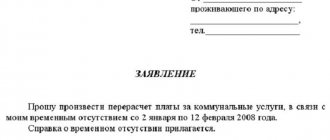The fact of payment for services provided by utility organizations is confirmed by the corresponding checks issued by banks when depositing funds. In order to be able to confirm account transfers, the owner should take care of storing this documentation. Let's consider the period during which receipts for payment for housing and communal services must be stored, taking into account the requirements of the law.
Save even a blank receipt.
There is no point in printing out receipts immediately after paying for housing and communal services on the Internet, experts say.
However, it is necessary to save the payment receipt on your computer so that you can print it out if any problems arise. This document does not have legal force, but it contains payment details and, by presenting a printout at the bank, you can receive a document with stamps indicating that the payment was made on time. If there is no receipt, you will have to remember on what dates, where and from which card you paid the rent. “Payment data is usually stored in the bank’s personal account. But it’s still worth saving receipts on your home computer in case of technical failures,” notes Alexey Koitov, head of the legal service of the representative office of the Union of Consumers of the Russian Federation in the Northwestern Federal District. “Even if the bank where you paid closes, information about the payment, knowing its details, can be restored through the Bank of Russia system or the tax service.”
If you pay through a terminal or some other electronic method, enter your phone number or email address at the request of the device to receive an electronic receipt for payment. If you didn’t enter it, it means you refused to receive the check.
Often, a management company or settlement center offers payment for housing and communal services through its website. Is it worth using this housing and communal services and urban environment” Dmitry Gordeev. — If she recalculates every six months and delays in explaining payments, then I don’t recommend using this service. It is better to pay for housing and communal services through a reliable bank, where you can also, if necessary, confirm a transaction that “did not go through.”
If you receive payments electronically, save this still unpaid receipt. “There is a possibility that the organization that sent it to you will retroactively change the numbers in the payment slip,” Gordeev points out. “And later you will have to prove that the bill was exactly what you paid.”
Information on the receipt
Receipts are intended for financial payment, so it is important that the receipts are in the exact form approved by law.
There are a number of data that must be included in the receipt for payment of utility services, namely:
- Types of communal resources. The type of good consumed must be indicated, not the general name.
- Consumption standards.
- Requisites. The receipt must indicate the bank details of the company where the money is transferred.
Management companies rarely give recommendations to residents regarding the storage of receipts, so that in the event of a dispute they have an advantage in evidence over the owner. Payment for consumed resources is made monthly. The homeowner receives a receipt indicating how many resources were consumed and how much he needs to pay for the services provided. If the money is not deposited within the prescribed period, then the person becomes a debtor.
But if the reason for the lack of money is, for example, a technical failure, then such debt can be canceled in court. If the payment was made in full, but it did not reach the account and the person lost the receipt, then the citizen will not be able to prove the fact of payment and will have to pay a second time for the service received.
Are receipts needed when selling an apartment?
Will printouts of receipts be useful when selling an apartment to prove that you have no rent arrears? Hardly.
“The debt for housing and communal services does not pass to the buyer! - emphasizes the leading expert of the Sushchevsky office, Evgeny Konoplev. — The maximum that the new owner will receive is an extra call from the manager. To which I would have every right to answer: this is not my debt, sort it out with the previous owner. However, in practice, I cannot remember a case where a professional realtor allowed a client to buy an apartment with debts for housing and communal services.”
The only debt that passes to the new owner is for contributions for major repairs. This sometimes happens when the management company has not entered into an agreement with the Capital Repair Fund (most often the owner is not even aware of this). If the realtor does not see the line “contribution to the capital repair fund” in the monthly receipt, then he “turns on the bore” and demands to prove with a separate certificate the absence of such debt or its repayment. In this case, the client will have to prove the payment not by printing out a PDF file, but by a full-fledged bank receipt.
Storage order
To ensure proper records and to be able to find the required documents if necessary, papers should be stored taking into account the following recommendations:
- receipts must be placed in separate folders, depending on the recipient of the payment;
- documents are laid out in chronological order, with newer payments placed on top and stapled;
- each year is completed separately.
If a consumer pays simultaneously for housing and communal services to several addresses, these payment bills should not be mixed. Receipts must be divided, placing separate documents for each apartment. Orderly placement of documentation will make it easy to find the necessary paper, if necessary.
Properly organized storage of housing and communal services bills will allow you to confirm the deposit of funds, excluding claims from utility organizations. And a properly organized storage order will ensure a quick search for papers if the need arises.
Best before date
The statute of limitations for debts for housing and communal services is three years. Receipts - both paper and electronic - should be kept for at least this period. But experts advise adding at least a few more months.
“It may happen that the management organization filed a claim against you in court at the very end of this period, but they have not yet had time to notify you about this,” says Alexey Koitov. “And if in exactly three years you throw away all the bills, you will be left without evidence.” Therefore, it is advisable to store printouts or files for at least six months longer.”
What kind of receipts are we talking about?
A receipt is a document drawn up in accordance with established standards and confirming the fact of payment for services.
The form of the payment document is described in Order No. 924 of the Ministry of Construction and Housing and Communal Services of the Russian Federation. Everything is described in detail in the receipt: there is a separate line for each resource, and consumption rates for each utility service are given. Thanks to this, you can check whether the payment amount has been calculated correctly and control your expenses.
Despite the fact that the standards described in the Order are only approximate, in most cases the receipts look the same. This makes working with this type of document easier.
So, you paid for utilities and received a receipt. What to do next? We need to save it.
Legal requirements
For the provision of utility services, a fee is charged depending on the amount of resources consumed. For this purpose, the readings of individual meters, as well as the general house meter, are taken into account. Service fees are paid every month.
A receipt and check act as confirmation of the citizen’s fulfillment of his duties. If a person does not pay for a service, then he is represented as a debtor. But sometimes a situation arises when a citizen deposits money according to a receipt, but it does not reach the management company. The culprit may be an employee of the management company, and often this problem arises for technical reasons. Therefore, only with the help of a check and receipt will the payer be able to prove that he paid for the services used.
Receipts are sent directly by the management company, and they must meet the requirements specified in Order No. 924. It provides not only the content of the document, but also its appearance. Additionally, instructions are described on the basis of which the documentation is filled out. If these requirements are met, then the document has legal significance.
Information
The form of the receipt changes from time to time.
In 2021, the document must contain the following information:
- types of resources for which payment is made;
- resource characteristics;
- quantitative indicators represented by the number of services consumed;
- details for making payments;
- consumption standards approved in the LCD or PP;
- general information, which includes the full name of the citizen in whose name the receipts are received, the address of the apartment, as well as information about the management company provided by the BIC and TIN.
Citizens, using information from receipts, will be able to check the correctness of the payment.
If the receipt received by the apartment owner does not meet the requirements, then there is no need to pay or keep it, since this documentation has no legal force.
Why keep utility bills?
Every month, property owners receive detailed calculations of accrued payments. Utility bills include the following expense items:
- Hot and cold water supply.
- Heat supply.
- Sewerage.
- Garbage removal.
- Elevator Maintenance.
- Maintenance of the local area.
- Cleaning entrances.
- Electricity for lighting of common utility rooms.
- Deductions for major repairs , etc.
Each line is highlighted separately and calculated using strictly regulated formulas.
Receipts confirming payment of fees should be kept as proof of fulfillment of your duties for maintaining the housing. Modern payment methods do not always involve receiving paper receipts. When paying online, owners can save electronic receipts. They are also valid and are full proof of payments made.
The accrued amount is deposited into the account of the management company, which acts as an intermediary between home owners and service providers.
When is it okay to throw away receipts?
Based on the recommendations of lawyers, it is better to keep receipts for utility services for an apartment or house for as long as possible. For example, the period indicated above (3 years) may pass, but problems with the organization providing utilities remain. And then such a document, attached to the case, will become a powerful argument in your favor.
Important! Based on the laws of the Russian Federation, even if the statute of limitations has expired, the consumer can still demand protection of violated rights. The main thing is that such documents are properly executed.
Legislative aspect
The procedure for providing payment documents to apartment owners, the information that must be reflected in them, and the list of data that is prohibited from being posted are recorded in the following documents:
- Housing Code of the Russian Federation (Article 155);
- Decree of the Government of the Russian Federation No. 354 (clause 69);
- Order of the Ministry of Construction of the Russian Federation dated January 26, 2018 No. 43/pr;
- Letter of the Ministry of Construction of the Russian Federation dated June 21, 2018 No. 27125-OG/04;
- Federal Law No. 38;
- Code of Administrative Offenses (Part 1, Article 14).
None of these regulations mention the retention period for utility receipts.
RF PP No. 354 regulates what information should be contained in payment documents: about the premises, service provider, charging, etc.
The Order of the Ministry of Construction of the Russian Federation No. 43/pr approved the approximate form of the receipt.
According to Letter of the Ministry of Construction of the Russian Federation No. 27125-OG/04, the management company has the right to swap blocks and place in them additional information approved at the general meeting of owners.
Federal Law No. 38 “On Advertising” categorically prohibits placing advertising messages on receipts, including on the reverse side. The only exceptions are social advertising and reference information - for example, about sites where you can pay for housing and communal services.
The Code of Administrative Offenses establishes fines for violation of Federal Law No. 38 and Order of the Ministry of Construction No. 43/pr.
What the law says
There is no law in the Russian Federation establishing clear terms for storing payment documents. But we must not forget about Art. 196 of the Civil Code of the Russian Federation, according to which a citizen or organization that has discovered a violation of rights may file a claim in court within three years.
Calculation of the storage period (prescription) begins with the month for which payment is made. For example, if an owner transfers funds in May 2021, the retention period ends on June 1, 2021.
It is also worth considering the provisions of Art. 199 of the Civil Code of the Russian Federation: if the statute of limitations has expired, the Criminal Code will still be able to go to court to protect its rights and interests. If a citizen does not provide receipts confirming the payment of utility services, he will have to pay everything again.
When transferring a case to bailiffs, an additional enforcement fee of 7% of the debt amount is charged. In addition, by a court decision, the owner may be required to pay a fine, the amount of which depends on the length of the delay:
- up to 90 days inclusive – 1/300 of the refinancing rate of the Central Bank of the Russian Federation;
- from 91 days – 1/130 of the key rate.
Payments may not be received for various reasons, ranging from making mistakes when filling out a document when paying via the Internet, to indicating incorrect details of the management company itself. In the latter case, the fault lies entirely with the management company, and it will not be possible to recover money from the consumer.
When can you throw away receipts?
Many people are looking for where to look at the requirements for utility payment receipts. Basically, tenants are interested in when they can throw away their canceled payments. But there are no deadline requirements as such. Since “payments” for housing and communal services are subject to a statute of limitations law, after 3 years you may no longer need them. But lawyers recommend approaching this issue carefully and, if possible, not throwing away these papers for another 2-3 years.










